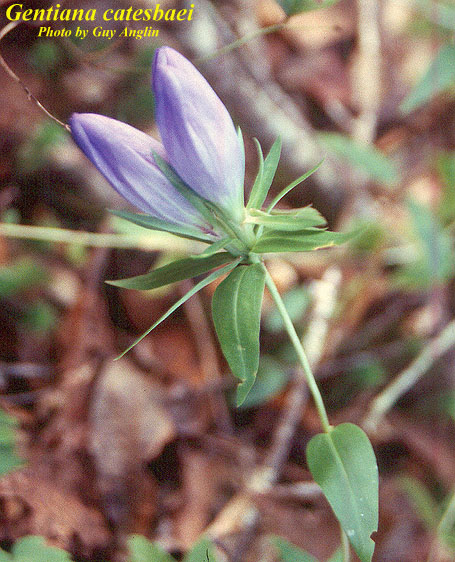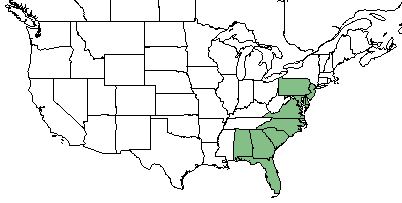Difference between revisions of "Gentiana catesbaei"
(→Taxonomic Notes) |
(→Description) |
||
| Line 24: | Line 24: | ||
<!-- Basic life history facts such as annual/perrenial, monoecious/dioecious, root morphology, seed type, etc. --> | <!-- Basic life history facts such as annual/perrenial, monoecious/dioecious, root morphology, seed type, etc. --> | ||
| − | ''G. catesbaei'' is a perennial forb native to the southeast United States <ref name="USDA"> USDA Plants Database URL: https://plants.usda.gov/core/profile?symbol=GECA10 </ref> | + | ''G. catesbaei'' is a perennial forb that is a member of the Gentianaceae family native to the southeast United States.<ref name="USDA"> USDA Plants Database URL: https://plants.usda.gov/core/profile?symbol=GECA10 </ref> |
==Distribution== | ==Distribution== | ||
Revision as of 16:36, 17 May 2019
Common names: Elliott's gentian; coastal plain gentian
| Gentiana catesbaei | |
|---|---|

| |
| Photo by the Atlas of Florida Plants Database | |
| Scientific classification | |
| Kingdom: | Plantae |
| Division: | Magnoliophyta - Flowering plants |
| Class: | Magnoliopsida - Dicots |
| Order: | Gentianales |
| Family: | Gentianaceae |
| Genus: | Gentiana |
| Species: | G. catesbaei |
| Binomial name | |
| Gentiana catesbaei Walter | |

| |
| Natural range of Gentiana catesbaei from USDA NRCS Plants Database. | |
Contents
Taxonomic Notes
Synonyms: G. catesbaei var. catesbaei; G. catesbaei var. nummulariifolia Fernald; Dasystephana latifolia (Chapman) Small; D. parvifolia (Chapman) Small; Pneumonanthe catesbaei (Walter) F.W. Schmidt
Description
G. catesbaei is a perennial forb that is a member of the Gentianaceae family native to the southeast United States.[1]
Distribution
The distribution of G. catesbaei ranges from north Florida to southeastern Pennsylvania and New Jersey [1].
Ecology
Habitat
G. catesbaei can be found in "pocosins, moist longleaf pine savanna edges, edges of moist hardwood forests, bluff seepages" [2]. Habitat typically has saturated, loamy, peat soil [3].
Phenology
This species typically flowers from late September through November[2], but can still have flowers present through mid-December [3].
Conservation and Management
Cultivation and restoration
Photo Gallery
References and notes
- ↑ 1.0 1.1 USDA Plants Database URL: https://plants.usda.gov/core/profile?symbol=GECA10
- ↑ 2.0 2.1 Weakley, A. S. (2015). Flora of the Southern and Mid-Atlantic States. Chapel Hill, NC, University of North Carolina Herbarium.
- ↑ 3.0 3.1 Florida State University Robert K. Godfrey Herbarium database. URL: http://herbarium.bio.fsu.edu. Last accessed: May 2018. Collectors: Loran C. Anderson, R. K. Godfrey, A. Gholson Jr., D. C. Vickers, Steve N. Jones, Rodie White, R. Komarek and R. Kral. States and Counties: Alabama: Covington and Coffee. Georgia: Grady and Thomas. Florida: Leon, Gadsden, and Wakulla.